Toyota Hilux VS Kia Picanto – Specs, Efficiency & Price Comparison
Find out now which car fits your needs better!
The Toyota Hilux (Pickup) is powered by a Diesel MHEV or Diesel engine and comes with a Automatic or Manuel transmission. In comparison, the Kia Picanto (Hatchback) features a Petrol engine and a Manuel or Automatic gearbox.
When it comes to boot capacity, the Toyota Hilux offers , while the Kia Picanto provides 255 L – depending on what matters most to you. If you’re looking for more power, you’ll need to decide whether the 204 HP of the Toyota Hilux or the 79 HP of the Kia Picanto suits your needs better.
There are also differences in efficiency: 9.70 L vs 5.20 L. In terms of price, the Toyota Hilux starts at 39800 £, while the Kia Picanto is available from 14600 £.
Compare all the key specs now and find out which model fits your lifestyle best!
Toyota Hilux
The Toyota Hilux has long been celebrated for its remarkable durability and reliability, making it a favourite among those needing a robust vehicle for rugged terrains. Known for its unyielding performance, the Hilux combines practicality with a surprisingly comfortable driving experience, both on and off the road. With its distinctive design and advanced safety features, it continues to be a versatile choice for adventurers and professionals alike.
details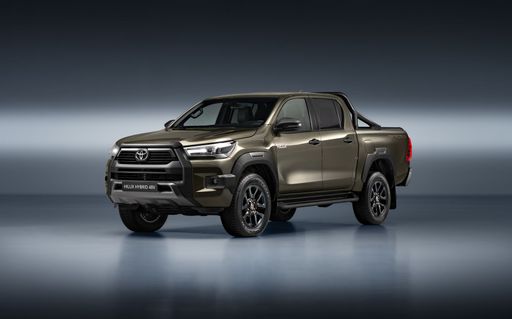 @ toyota-media.de
@ toyota-media.de
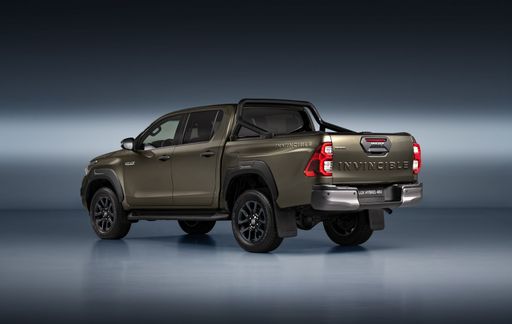 @ toyota-media.de
@ toyota-media.de
Kia Picanto
The Kia Picanto is a compact city car that combines practicality with a stylish design, making it an appealing option for urban drivers. Its cleverly designed interior maximises space, providing ample room for passengers and luggage despite its small footprint. With its efficient fuel consumption and easy manoeuvrability, the Picanto is well-suited for navigating through bustling city streets.
details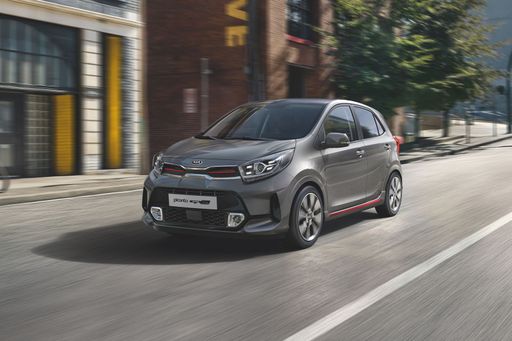 @ press.kia.com
@ press.kia.com
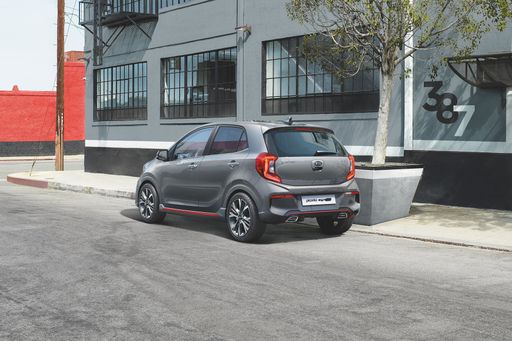 @ press.kia.com
@ press.kia.com
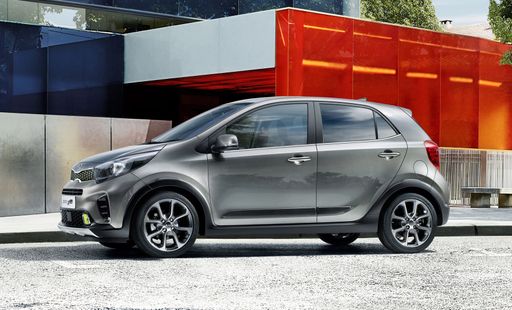 @ press.kia.com
@ press.kia.com
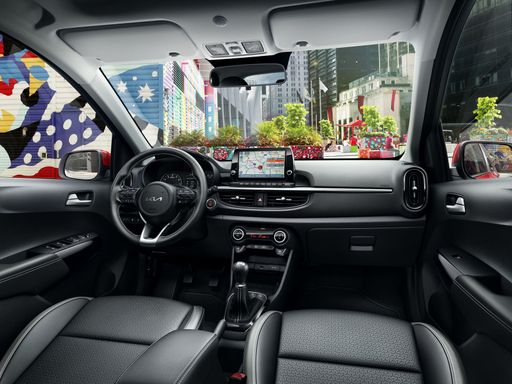 @ press.kia.com
@ press.kia.com

|

|
|
|
|
Costs and Consumption |
|
|---|---|
|
Price
39800 - 56200 £
|
Price
14600 - 19300 £
|
|
Consumption L/100km
9.7 - 10 L
|
Consumption L/100km
5.2 - 5.7 L
|
|
Consumption kWh/100km
-
|
Consumption kWh/100km
-
|
|
Electric Range
-
|
Electric Range
-
|
|
Battery Capacity
-
|
Battery Capacity
-
|
|
co2
253 - 264 g/km
|
co2
118 - 130 g/km
|
|
Fuel tank capacity
80 L
|
Fuel tank capacity
35 L
|
Dimensions and Body |
|
|---|---|
|
Body Type
Pickup
|
Body Type
Hatchback
|
|
Seats
4 - 5
|
Seats
4 - 5
|
|
Doors
2 - 4
|
Doors
5
|
|
Curb weight
2085 - 2155 kg
|
Curb weight
981 - 991 kg
|
|
Trunk capacity
-
|
Trunk capacity
255 L
|
|
Length
5325 mm
|
Length
3605 mm
|
|
Width
1855 mm
|
Width
1595 mm
|
|
Height
1810 - 1815 mm
|
Height
1485 mm
|
|
Payload
1040 - 1125 kg
|
Payload
339 - 425 kg
|
Engine and Performance |
|
|---|---|
|
Engine Type
Diesel MHEV, Diesel
|
Engine Type
Petrol
|
|
Transmission
Automatic, Manuel
|
Transmission
Manuel, Automatic
|
|
Transmission Detail
Automatikgetriebe, Schaltgetriebe
|
Transmission Detail
Schaltgetriebe, Automatisiertes Schaltgetriebe
|
|
Drive Type
All-Wheel Drive
|
Drive Type
Front-Wheel Drive
|
|
Power HP
150 - 204 HP
|
Power HP
63 - 79 HP
|
|
Acceleration 0-100km/h
10.70 s
|
Acceleration 0-100km/h
13.1 - 18.2 s
|
|
Max Speed
170 - 175 km/h
|
Max Speed
145 - 159 km/h
|
|
Torque
400 - 500 Nm
|
Torque
93 - 113 Nm
|
|
Number of Cylinders
4
|
Number of Cylinders
3 - 4
|
|
Power kW
110 - 150 kW
|
Power kW
46 - 58 kW
|
|
Engine capacity
2393 - 2755 cm3
|
Engine capacity
998 - 1197 cm3
|
General |
|
|---|---|
|
Model Year
2024 - 2025
|
Model Year
2024
|
|
CO2 Efficiency Class
G
|
CO2 Efficiency Class
D
|
|
Brand
Toyota
|
Brand
Kia
|
Toyota Hilux
Discover the Iconic Toyota Hilux: A Blend of Robustness and Innovation
The Toyota Hilux is a name synonymous with durability and reliability, making it a favourite in the pick-up market. But beyond its rugged exterior, the Hilux offers a multitude of technological advancements and engineering marvels that are worthy of exploration. In this article, we'll delve into the details that make the Toyota Hilux a remarkable vehicle in its class.
Engineering Excellence: Under the Hood of the Hilux
The Toyota Hilux is powered by a 2.4-litre D-4D diesel engine, delivering a robust 150 PS and a torque of 400 Nm. This engine configuration ensures that the Hilux maintains impressive pulling power and performance, be it on or off the road. The vehicle is equipped with an automatic 4x4 transmission, which enhances its off-road capabilities while ensuring a smooth ride on urban pavements.
Despite its powerful performance, the Hilux is relatively efficient for a vehicle of its size, offering a consumption rate of 8.7 L/100km. The 80-litre fuel tank capacity ensures fewer stops on longer journeys, making it a reliable companion for adventure seekers.
Structural Strength and Versatility
What sets the Hilux apart is its build quality. With a length of 5325 mm, width of 1855 mm, and height of 1815 mm, the Toyota Hilux embodies a commanding presence. It is designed to handle a payload of up to 1025 kg, making it a perfect choice for those requiring a tough utility vehicle without compromising on comfort and style. Moreover, its 5-seat capacity ensures that it's as comfortable for passengers as it is practical for cargo.
Innovative Features for Enhanced Comfort and Safety
The Toyota Hilux is equipped with a plethora of features aimed at enhancing driver and passenger comfort and safety. Its "Comfort 4x4 Automatik" line includes modern technological integrations, such as advanced infotainment systems and driver assistance features. This line of improvements ensures that every journey in the Hilux is as pleasurable as it is safe.
In terms of safety standards, the Hilux does not compromise. It comes packed with a range of driver assistance systems, ensuring a secure drive in both urban and off-road environments. Though it scores a CO2 efficiency class of G, plans for future iterations of the Hilux aim to incorporate more eco-friendly technologies.
Conclusion: The Toyota Hilux Legacy
The Toyota Hilux continues to be a cornerstone in the pick-up truck market, offering reliability, power, and innovation. With its blend of engineering excellence, versatile design, and cutting-edge features, the Hilux stands its ground as a leader in its category. Whether you are navigating city streets or exploring the wild, the Toyota Hilux is engineered to handle it all with grace and strength.
Kia Picanto
Compact Versatility: An Overview of the Kia Picanto
The Kia Picanto, with its chic and compact design, is a staple in urban landscapes across the globe. Offering a deft blend of efficiency, style, and functionality, the Picanto continues to evolve, catering to the demands of the modern driver. With the 2024 model year, Kia reaffirms its commitment to providing a small car that doesn't compromise on quality or innovation.
Engine Performance and Fuel Efficiency
The Kia Picanto comes with several engine options tailored to different needs, featuring both manual and automatic transmissions. The engines range from a 1.0-litre 3-cylinder to a 1.2-litre 4-cylinder, providing a power output between 63 and 79 PS. This allows the Picanto to offer a versatile driving experience that suits both urban and suburban environments. Fuel consumption is impressively low, with figures ranging between 5.2 to 5.7 litres per 100 km, emphasising the car's eco-friendly credentials.
Innovative Design and Technology
In terms of design, the Picanto boasts sleek lines and a modern silhouette. Although it's a five-door hatchback, the car maintains its compactness with dimensions of 3605 mm in length, 1595 mm in width, and 1485 mm in height. Inside, the Picanto surprises with its clever use of space, providing a comfortable cabin for up to five passengers and a boot capacity of 255 litres.
The Picanto is equipped with advanced technology aimed at enhancing the driver's experience and safety. Available equipment lines such as Edition 7, Vision, and GT Line offer varying levels of features, including improved infotainment systems and driver assistance technologies. These innovations make the Picanto not just economical, but also a smart choice for tech-savvy car buyers.
Safety Features and Driving Comfort
Safety has always been a priority for Kia, and the Picanto is no exception. The 2024 model comes equipped with a suite of safety features designed to protect its occupants. From enhanced structural integrity to available driver assist systems, Kia ensures that driving the Picanto is both secure and enjoyable. The Picanto manages speed efficiently, with a top range between 145 to 159 km/h, and provides a torque of 95 to 115 Nm, aiding in confident handling and acceleration.
Environmental and Economic Benefits
With CO2 emissions ranging from 118 to 130 g/km, the Picanto holds a D efficiency class. This is a significant factor for environmentally conscious drivers who still want to enjoy an efficient urban vehicle. The monthly cost of ownership is between €681 and €789, with a cost per kilometre of 27.2 to 31.6 cents, positioning the Picanto as an economically wise choice for budget-conscious drivers.
The Final Verdict
Overall, the Kia Picanto remains a formidable contender in the compact car segment, thanks to its combination of practicality, innovation, and efficiency. Whether navigating the bustling city streets or heading out on a weekend road trip, the Picanto proves to be a reliable and economical partner. With its modern styling and cutting-edge technology, it stands as a testament to Kia’s ability to adapt and thrive in the ever-evolving automotive landscape.
The prices and data displayed are estimates based on German list prices and may vary by country. This information is not legally binding.
